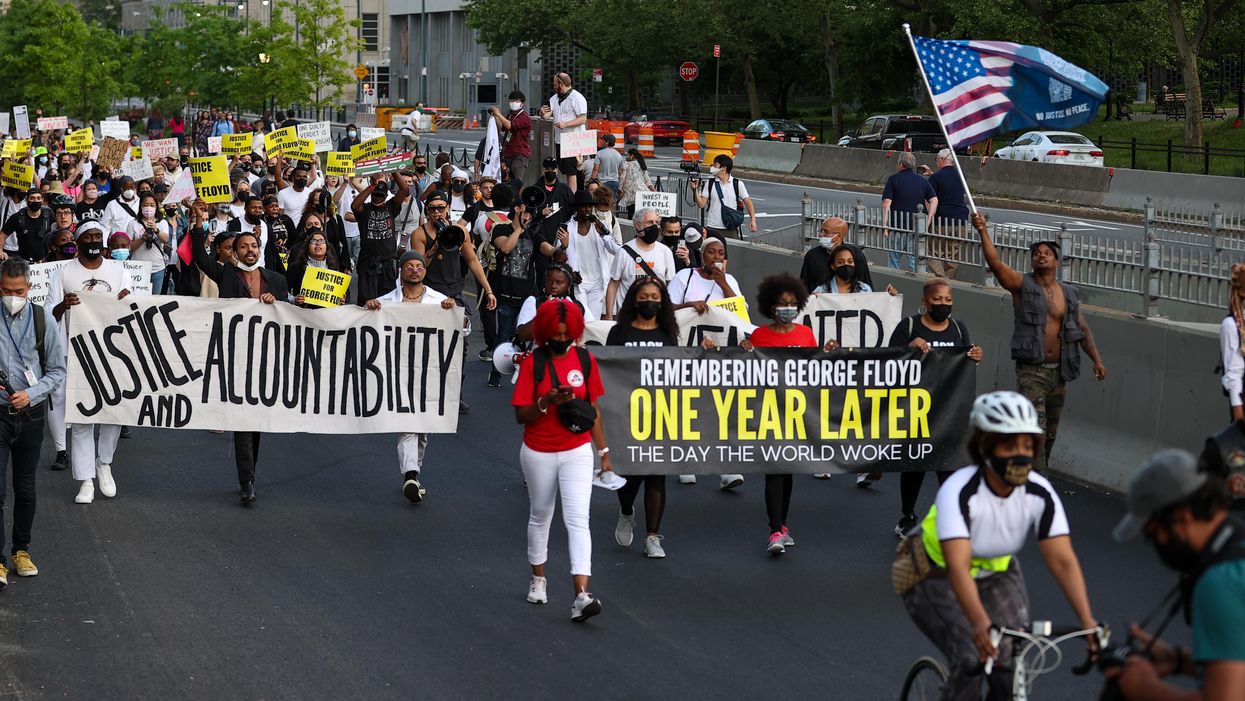After the police killing of George Floyd last year, the nation erupted in protest with renewed demands for justice and reform. But now that right to assembly is under attack.
In the year since Floyd's death, GOP lawmakers have been pushing measures to deter protesting and toughen penalties for offenders. Nearly 100 such anti-protesting bills have been proposed across 35 states — four times the numbers introduced in the year prior.
This wave of bills parallels another effort by Republicans to roll back voting rights and access following the 2020 election. Opponents claim both legislative trends disproportionately impact communities of color who have been actively involved in protests over the last year and are more likely to face barriers to the ballot box.
The International Center for Not-for-Profit Law has been tracking federal and state initiatives aimed at restricting the right to peaceably assemble since 2016. In the last year, nine new measures have been signed into law across seven states. While this is a slight uptick from the year before, the sheer volume of anti-protesting bills being considered in state legislatures is much higher than the usual amount.
"These bills are part of a broader trend over the past four years of state legislatures moving to repress peaceful demonstrations," the ICNL said in a January report. The trend began around 2017 when fossil fuel companies encouraged legislation that deterred environmental protests against oil pipelines. Now, anti-protesting bills have a new target: racial justice advocates.
Of the recently enacted laws, Florida's is among the most broad and severe. It expands the definition of riot to include "imminent danger" of property or persons so individuals could be charged with a felony without having committed any actual damage or injury. Peaceful protesters in the vicinity of those considered to be inciting a riot could be lumped together and all charged with a felony offense. If the group is 25 or more people, it's automatically considered an "aggravated riot" and participants could face up to 15 years in prison.
Florida's new law also makes it easier for anyone who injures a protester, such as by driving through a crowd, to avoid civil liability. Another provision of the law toughens penalties for people who deface, take down or otherwise damage a monument or memorial, including Confederate ones.
Oklahoma also recently enacted a law that grants immunity to drivers who "unintentionally" strike and injure protestors on public streets, while also imposing stricter penalties for people who obstruct traffic while participating in a "riot."
The measure was prompted in part by an incident last June when a man drove his pickup truck through a crowd of Black Lives Matter protesters, injuring several and leaving one person paralyzed from the waist down. Ultimately, the driver was not charged because he said he feared for the safety of his family, who was in the truck with him.
Many of the proposed and enacted measures use broad definitions that appear to conflate largely peaceful protests with instances of violent rioting and looting. However, an analysis by The Washington Post last October found that 96 percent of the Black Lives Matter protests over the summer were peaceful, and when violence did occur, it was often police officers who instigated it.
There's also concern the laws could infringe on First Amendment rights to freedom of speech and peaceful assembly. Clément Voule, United Nations special rapporteur on the rights to freedom of peaceful assembly and of association, released a statement last month expressing concern that these new rules may violate the U.S. Constitution as well as international law.
"Vague definitions of 'riot,' 'mob intimidation' and 'obstruction' as set out in these laws provide excessive discretion to law enforcement authorities to intimidate and criminalize legitimate protest activities," Voule said. "Any restrictions on this fundamental freedom must be narrowly and clearly defined."
Over the last decade, American democracy has been in a steady decline, according to studies by the nonpartisan research organization Freedom House. In March, the group pinpointed three main issues that have driven this long-term decline: unequal treatment of people of color, special-interest influence in politics and partisan polarization.
Despite these concerning trends, there is still evidence of the resiliency of democracy, said Shannon Hiller, co-director of the nonpartisan Bridging Divides Initiative at Princeton University.
"The widespread demonstrations in support of racial justice last year are also a really incredible story about the willingness of so many Americans to go out and use their First Amendment rights to stand up together on issues that they care about," said Hiller, whose organization works to track and mitigate instances of political violence in the United States.




















